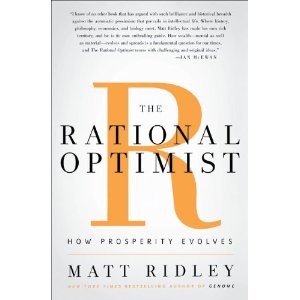"The Rational Optimist" by Matt Ridley
In Western culture, especially in the United States, we live in a time of fear. I could list the things we fear, from terrorism to climate change, but I’m sure you can list just as many. No need to restate the obvious.
The opposite of fear, at least in a secular/cultural perspective, is confidence (I tend to think the opposite of fear is faith, at least in theological thinking….but that’s another topic). So Matt Ridley has written an interesting book for interesting times: The Rational Optimist. The essence of the book is that ideas have sex…meaning they evolve and change the same way our genetic make up changes. Thus Adam Smith’s ideas about capitalism became a sort of dominate gene that has been around a few hundred years, but it has still been altered and shaped by newer/better ideas. It’s a reasonable way of thinking of how culture changes.
Ridley takes this basic idea and says there is therefore reason to have great confidence in the future. Ideas improve with time, bad ideas fade away, and we evolve into a better society. He makes this argument with dozens (hundreds?) of stories and explanations of everything from farming, trade, politics and societal shifts. He’s especially keen on commerce or trade as the catalyst that ignites most new ideas and is, therefore, our best hope for solving the world’s problems.
I don’t have a problem with the basic premise. But Ridley misses the point on some things. First, I believe that humanity is basically fallen and we will always have problems and challenges. His nearly pollyannish idea that we can solve our own problems is simplistic. Second, he uses a lot of arguments about how humanity has evolved that are largely speculative. When I hear authors use arguments about a stone age people and how they evolved…well, I tend to tune out. They don’t really know this stuff, it’s just an educated guess. It’s a convenient argument for an author to make because there is simply no way of proving it to be true or false.
In the end, I found the book to be too optimistic. Ridley tends to put tremendous faith in commerce and trade, a faith that I tend to share but that I’m smart enough to know comes with its own risks. If you are a person who tends to see things from a conservative perspective, you’ll like this book. But read it with caution and don’t get caught up in the broad generalities that it tends to utilize. If you are a person with a more progressive viewpoint, I encourage you to read this book as a way to challenge your perspective. It will do you good.

